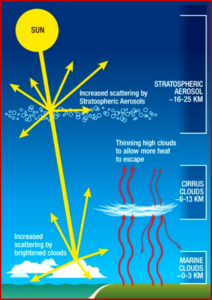The US should conduct a research program for Solar GeoEngineering in coordination with other nations, subject to governance, and alongside a strong portfolio of climate mitigation and adaptation policies, says a new report from the National Academies of Sciences, Engineering, and Medicine. There currently is no coordinated national effort for solar GeoEngineering research. (UN on Global Warming: Rapid, Far-Reaching Unprecedented Changes in All Aspects of Society Needed; and SEC Starts Task Force on Climate Change Investment Risks)
The report emphasizes that solar geoengineering is not a substitute for reducing greenhouse gas emissions. Solar GeoEngineering discusses strategies designed to cool Earth either by adding small reflective particles to the upper atmosphere, by increasing reflective cloud cover in the lower atmosphere, or by thinning high-altitude clouds that can absorb heat.
“While such strategies have the potential to reduce global temperatures and thereby ameliorate some of the risks posed by climate change, they could also introduce an array of unknown or negative consequences,” said the NASEM. (Top Five Air Pollution Actions to Improve Health, Climate; and Draining the Swamp – California, 22 States Sue to Stop Trump Emissions Rollback Citing Economic, Health and Climate Goals)
The research should work to better understand Solar GeoEngineering’s technical feasibility, possible impacts on society and the environment, public perceptions, and potential social responses –“but it should not be designed to advance future deployment of these interventions.” Scientific understanding of many aspects of solar geoengineering technologies remains limited, including how they could affect weather extremes, agriculture, natural ecosystems, or human health.
“The US Solar GeoEngineering research program should be all about helping society make more informed decisions,” said Chris Field, Perry L. McCarty Director of the Stanford Woods Institute for the Environment, and chair of the committee that wrote the report. “As we continue to make slow progress in addressing climate change, we urgently need to understand the full range of options for alleviating its harms. Based on all of the evidence from social science, natural science, and technology – this research program could either indicate that Solar GeoEngineering should not be considered further or conclude that it warrants additional effort.”
The report recommends a wide-ranging plan for governing solar geoengineering research to ensure it moves forward in a socially responsible manner. Researchers should follow a code of conduct and research should be catalogued in a public registry, be subject to regular program assessment and review, and allow for public engagement.
“Scientific understanding of many aspects of Solar GeoEngineering technologies remains limited, including how they could affect weather extremes, agriculture, natural ecosystems, or human health,” the report said.
The study – by the Committee on Developing a Research Agenda and Research Governance Approaches for Climate Intervention Strategies that Reflect Sunlight to Cool Earth – was sponsored by the Band Foundation, US Department of Energy, National Academy of Sciences’ Arthur L. Day Fund, National Oceanic and Atmospheric Administration, Christopher Reynolds Foundation, John D. and Catherine T. MacArthur Foundation, National Aeronautics and Space Administration, and V. Kann Rasmussen Foundation.
The National Academies of Sciences, Engineering, and Medicine are private, nonprofit institutions that provide independent, objective analysis and advice to the nation to solve complex problems and inform public policy decisions related to science, technology, and medicine. They operate under an 1863 congressional charter to the National Academy of Sciences, signed by President Lincoln.



Pingback: Climate Change: UK Automotive CO2 Output Falls in 2021 | AutoInformed